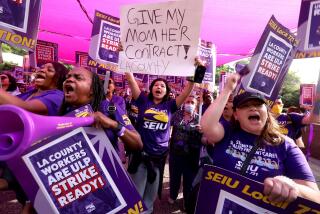Union Chief Doesn’t Rule Out AT&T; Strike
- Share via
WASHINGTON — The head of the biggest union negotiating a new contract with American Telephone & Telegraph Co. said Thursday that there will be no strike against the company this weekend but refused to rule one out later.
Communications Workers of America President Morton Bahr added during a break in the protracted talks that his negotiators will walk away from the table if there is no sign of an agreement by Friday.
Asked about a walkout, Bahr said, “We’re not striking this weekend; that’s all I’m prepared to say.”
He told a news conference that if talks break down, the CWA is prepared to launch an “electronic picket line” against AT&T; in which workers would switch their business to rival long-distance carriers.
The CWA, representing 100,000 AT&T; workers, and the International Brotherhood of Electrical Workers, representing 27,000, have been negotiating nearly nonstop with AT&T; since their contracts expired Saturday.
Bahr said that short of a strike, the unions would first take other steps. “We have developed measures that will allow us to put even greater pressure on AT&T; than we would have had we decided to strike last Saturday,” he said.
He told a news conference that job security is the top union aim and that despite the intensive talks, “we still have not received a final proposal from the company.”
CWA officials said AT&T; had cut more than 100,000 jobs in the past eight years by automation, corporate downsizing and shifting union-covered work to non-union subsidiaries.
The unions are also seeking to improve pay and pensions.
AT&T; has said it wanted greater flexibility in the work force to meet growing telecommunications competition.
William Ketchum, AT&T; vice president for labor relations, told reporters later that the company had offered union members improved job security as well as a pay raise of 9.75% over three years, up from its initial offer of 8%.
Bahr said the “electronic picket line” against AT&T; could cost the company $3 million to $5 million a week in lost revenue.
The move would begin with tens of thousands of CWA members having their long-distance telephone service switched to other companies, Bahr said, adding that the members have already authorized the switch.
He said pressure could be stepped up by expanding the boycott to all 15 million union members in the United States, small businesses and ultimately to supporters worldwide.
But Ketchum said he found an “electronic picket line” hard to understand, asking why a union would ask its members to shift their business to predominantly non-union companies.
AT&T;’s chief rivals, Sprint Corp. and MCI Communications Corp., as well as most of the smaller long-distance carriers, are non-union.
AT&T; said it has contingency plans if the unions strike, including using active and retired managers and hiring temporary workers.
The company and its unions agreed on a contract three years ago without a strike, but in 1986 the CWA struck for 26 days before coming to terms.
AT&T;’s stock closed unchanged Thursday at $41.625.
More to Read
Inside the business of entertainment
The Wide Shot brings you news, analysis and insights on everything from streaming wars to production — and what it all means for the future.
You may occasionally receive promotional content from the Los Angeles Times.










